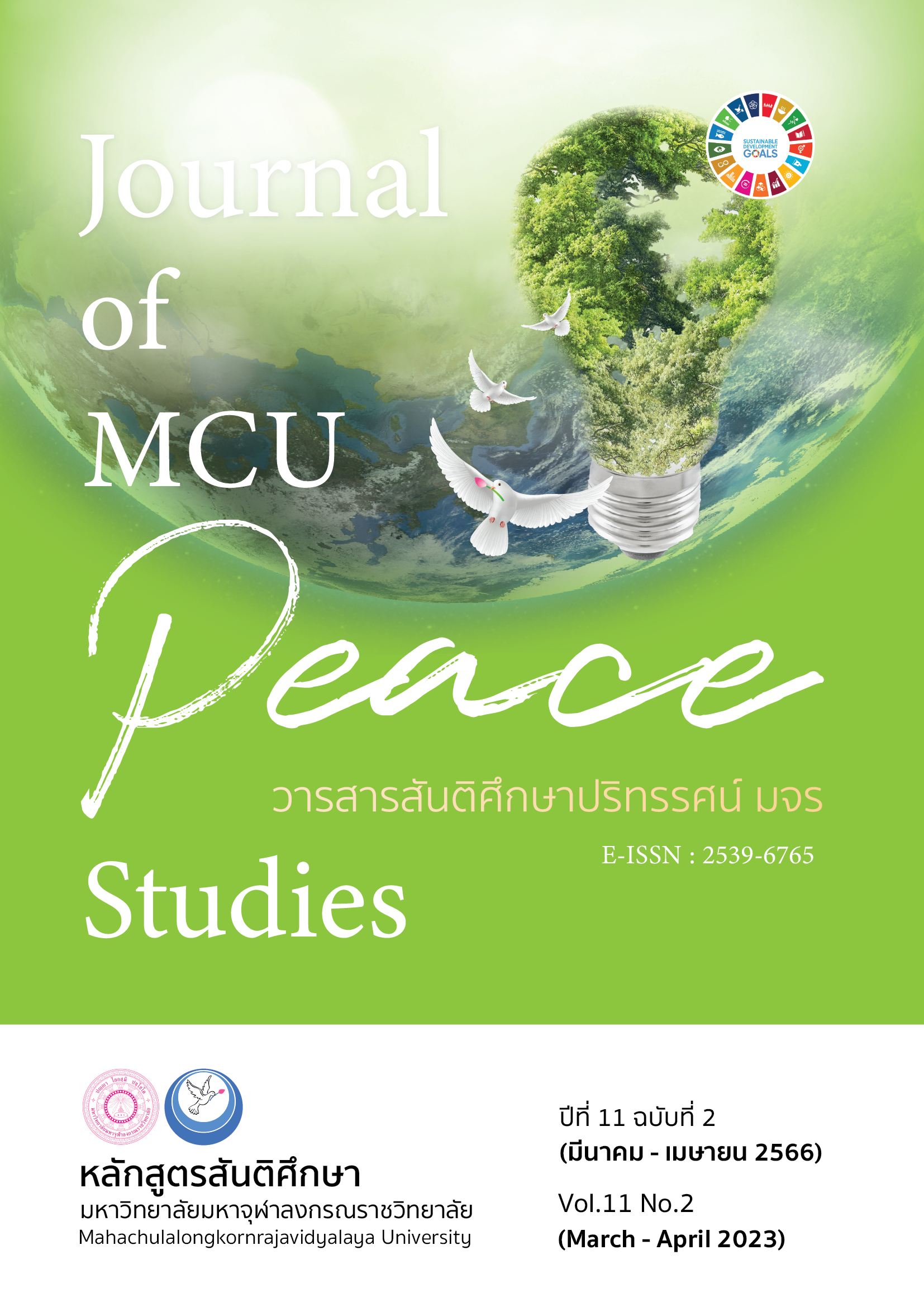การพัฒนาพุทธกสิกรรมอย่างยั่งยืนโดยพุทธสันติ: ศึกษากรณีชุมชน หมู่ที่ 4 บ้านหนองแต้ ตำบลตลิ่งชัน อำเภอเมือง จังหวัดสุพรรณบุรี
Main Article Content
บทคัดย่อ
บทความวิจัยนี้มีวัตถุประสงค์ 1) เพื่อศึกษาบริบท สภาพปัญหา ความต้องการจำเป็นเกี่ยวกับการพัฒนาพุทธกสิกรรมอย่างยั่งยืน 2) เพื่อศึกษาวิเคราะห์พุทธสันติวิธีที่เอื้อต่อการพัฒนาพุทธกสิกรรมอย่างยั่งยืน 3) เพื่อพัฒนาและนำเสนอการพัฒนาพุทธกสิกรรมอย่างยั่งยืนโดยพุทธสันติวิธี เป็นงานวิจัยรูปแบบอริยสัจจ์โมเดลสอดคล้องกับการวิจัยเชิงปฏิบัติการแบบมีส่วนร่วมภายใต้กรอบการดำเนินการวิจัย 9 ขั้นตอน กลุ่มผู้ให้ข้อมูลสำคัญ ได้แก่ นักวิชาการจำนวน 8 รูป/คน ผู้นำชุมชน ผู้นำทางศาสนา กสิกรจำนวน 27 รูป/คน โดยการสัมภาษณ์เชิงลึกแบบเจาะจง และนำมาวิเคราะห์อธิบายเชิงพรรณนา
ผลการวิจัยพบว่า 1) สภาพพื้นที่ชุมชนอยู่นอกเขตชลประทาน ประสบภัยแล้งซ้ำซาก ดินขาดความอุดมสมบูรณ์ ความต้องการจากปัญหาสำคัญ คือ น้ำไม่เพียงพอสำหรับการกสิกรรม รายได้หนี้สิน อีกทั้งขาดความรู้ในด้านกสิกรรมอินทรีย์ ในการพัฒนาพุทธกสิกรรมอย่างยั่งยืน ด้วยการพัฒนาพื้นที่ต้นแบบ โคกหนองนา โมเดล ตามแนวทฤษฎีใหม่หลักปรัชญาเศรษฐกิจพอเพียง พลิกฟี้นความอุดมสมบูรณ์ สู่การพึ่งพาหลักจากการปลูกข้าวอย่างเดียวตามฤดูกาลปีละครั้งมีราคาตกต่ำไม่พอต่อการดำรงชีพเกิดความยากจนเป็นตนเองในปัจจัยทางเศรษฐกิจและสังคม สร้างวิถีกสิกรรมอาชีพใหม่ มีความมั่นคงทางอาหาร แม้ในยามเกิดวิฤตการณ์ มีพออยู่ พอกิน พอใช้ ดำเนินชีวิตอย่างสุขสงบในพื้นที่ของตนเอง 2) การนำอิทธิบาทธรรมในพระพุทธศาสนามี ฉันทะ วิริยะ จิตตะ วิมังสา เป็นแนวทางตามหลักพุทธสันติวิธี ส่งเสริมการพัฒนาพื้นที่ พุทธกสิกรรม บนพื้นที่ของตนเองให้มีอาหารเพียงพอ พึ่งพาตนเองได้ โดยมีข้อปฏิบัติให้เข้าถึงธรรมเพื่ออยู่ร่วมกันในสังคมร่วมสมัย อย่างสุข สงบ ร่มเย็น ส่งต่อลมหายใจแห่งสันติภาพสู่อนาคต 3) พัฒนาสู่การอยู่ดี กินดี มีสุข ได้รูปแบบ 3ป. 4พ. โมเดล มีองค์ประกอบ 7 ประการ ได้แก่ (1) ป.ปรับหนอง เก็บกักน้ำไว้ใช้ในพื้นที่อย่างเพียงพอ (2) ป.ปรุงดิน ให้มีธาตุอาหารเหมาะสมต่อการเพาะปลูก (3) ป.ปลูกป่า การปลูกป่า 5 ระดับ (4) พ. พอใจ ความศรัทธา เริ่มที่ครอบครัวมีความเห็นต้องกันนำพื้นที่มาทำการพัฒนา (5) พ. พากเพียร การมุ่งมั่นต่อเนื่องให้สู่ความสำเร็จ (6) พ. พร้อมตั้งใจ ใจที่รักษาด้วยสติมีความจดจ่อในหน้าที่ (7) พ.พัฒนา การทบทวนในสิ่งที่คิดและดำเนินไปในแนวทางที่ดีที่วาดหวังได้
Article Details

อนุญาตภายใต้เงื่อนไข Creative Commons Attribution-NonCommercial-NoDerivatives 4.0 International License.
ทัศนะและความคิดเห็นที่ปรากฏในบทความในวารสาร ถือเป็นความรับผิดชอบของผู้เขียนบทความนั้น และไม่ถือเป็นทัศนะและความรับผิดชอบของกองบรรณาธิการ ยินยอมว่าบทความเป็นลิขสิทธิ์ของวารสาร
เอกสารอ้างอิง
Chan-on, N. (2021). Academic Article on Food Security in Thailand. Retrieved June 20, 2021, from http://library.senatego.th/document/Ext7091/7091777_0002.PDF
Chantanee, A., & Changcharoen, C. (2014). Buddhism and Sufficiency Economy Philosophy, Journal of Management Science Review, 22(2), 241- 250.
Charoenrat, S. (2021). Community Forest Food Security and the Push for Justice for Local Communities.Retrieved May 1, 2021, from http://www.cusri.chula.ac.th/backup /download/cluster5.pdf
Duangthisan, A., & Ketwong, A. (2021). Management to Build a Strong Community under Sufficiency Economy Philosophy : Case Study of Khon Sawan Distric Chaiyaphum Province. Journal of MCU Social Science Review, 6(2), 347- 358.
Ladi, S. (2000). A Study of Sufficiency Economy Project Implementation in Elementary Schools under the Udon Thani Provincial Primary Education Office. (Master’s Thesis). Graduate School: Khon Kaen University. Khon Kaen.
Mahachulalongkornrajavidyalaya University. (1996). Thai Tripitaka: Bangkok: MCU Press.
Mukpradit, M. (2000). An Analytical Study of the Philosophy of Sufficiency Economy as a Result of His Majesty’s Initiative and Buddhist Principles. (Doctoral Dissertation). Graduate School: Mahachulalongkornrajavidyalaya University. Autthaya.
Office of the National Economics and Social Development Council. (2019). National Economic and Social Development Plan No. 12 B.E. 2017 - 2021 and 2022. Retrieved November 29, 2021, from https://www.nesdc.go.th/ewt_dl_link.php?nid=6422
Phaetrangsi, P. (2002). Evaluation of Self-Sufficient Community Economic Development Projects. According to the Royal Initiative in the New Theory Agriculture Project Case Study Farmers in Tha Mai District Chanthaburi Province. (Research Report). Chonburi: Burapha University.
Phra Bhramagunabhorn. (P.A. Payutto). (2018). Sustainable Development. (21st ed.). Nakhon Pathom: Wat Yan Wesakawan.
Phra Brahmapundit (Prayoon Dhammacitto). (2019). Religion and the Sustainable Development Goals (SDGs). (2nd ed.). Bangkok: Amarin Printing and Publishing.
Phra Mahahansa Dhamma Mahaso et al. (2022). Buddhist Agricultural Development Model Khok Nong Na Santi Study Model for Sustainable Development: A Case Study in Sisaket Province. Journal of MCU Peace Studies, 10(1), 48-64.
Phra Phratheb Rattanamuni (Saipong Anomapañño/Kongsin). (2014). Buddhist Agriculture for Solving the Problem of the Community Economy. (Doctoral Dissertation). Graduate School: Mahachulalongkornrajavidyalaya University. Ayutthaya.
Phramaha Weerasak Abhinandavedi (Sangphong). (2018). The Integration of the Buddhist Doctrines to the New Theory Agriculture Concerning to the King’s Philosophy. (Doctoral Dissertation). Graduate School: Mahachulalongkornrajavidyalaya University. Autthaya.
Prachuapwan, N. (2015). Development of Agricultural and Food Production System for the Strength of Ban Lak Meter Community Nakhon Pathom Province. Journal of Research for Area-Based Development, 7(4), 90-123.
Samudavanich, C. (1998). New Theory: The Grand Dimension of Thought. (1ST ed.). Bangkok: Konrad Adenauer Foundation.
Suphan Buri Provincial Office. (2021). Suphan Buri Province Development Plan, Fiscal Year 2018-2022, Review 2021. Retrieved November 29, 2021, from https://www.suphanburi. go.th/files/com_strategic/2019- 01_3698f41fc355f67.pdf
Tantivejkul, S. (2000). Under the Royal Family. (13th ed.). Bangkok: Matichon.
Thai PBS news. (2021). COVID-19 Has Caused More than 6Million People to Lose their Jobs. Retrieved June 6, 2021, from https://news.thaipbs.or.th/content/303369


